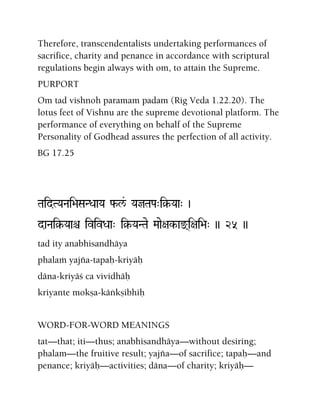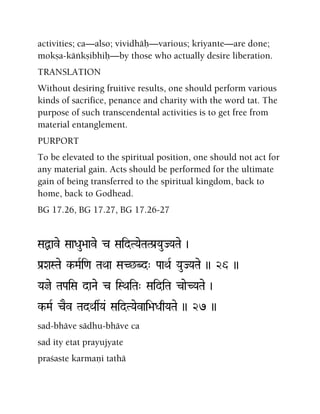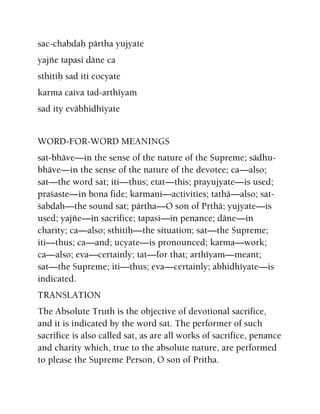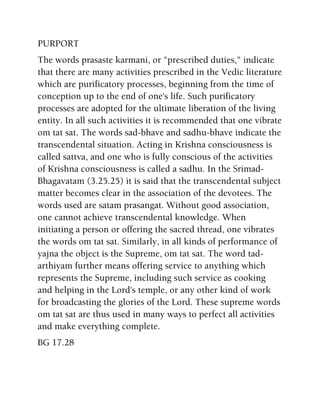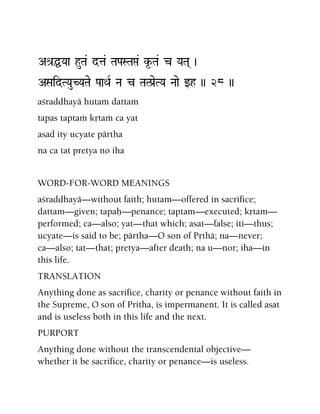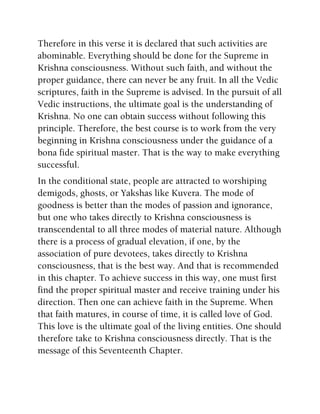- There are three types of faith that living beings can have based on the modes of material nature - faith in goodness, passion, or ignorance. Acts performed with faith in passion or ignorance only yield temporary material results, while acts performed with faith in goodness and according to scriptural injunctions purify the heart.
- One's faith is determined by the modes of nature they have acquired from their previous activities. While originally transcendental, when one comes in contact with material nature they take on qualities of sattva, rajas, or tamas.
- People with faith in goodness worship demigods, those with faith in passion worship demons, and those with faith in ignorance worship ghosts.
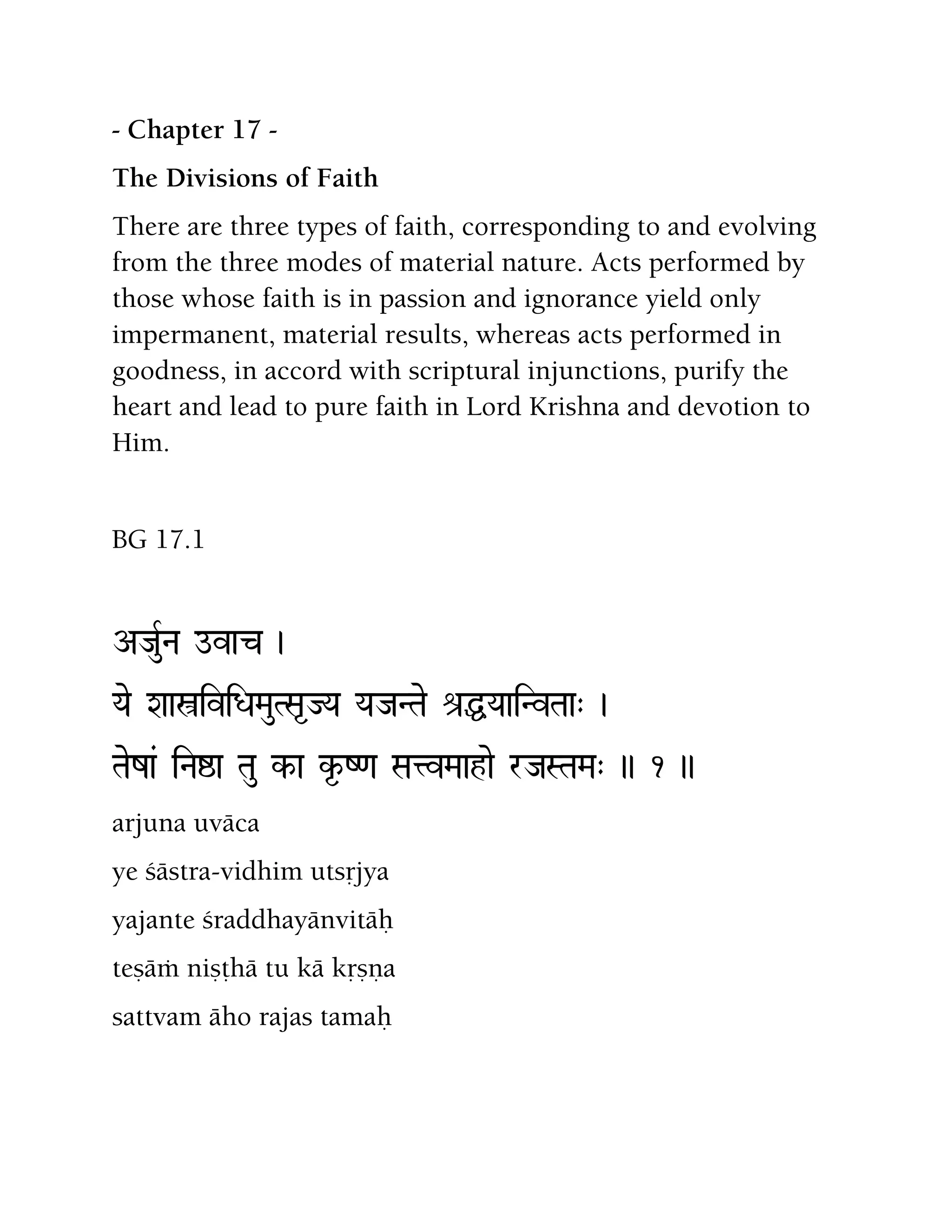
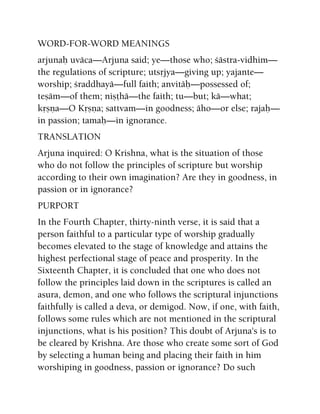
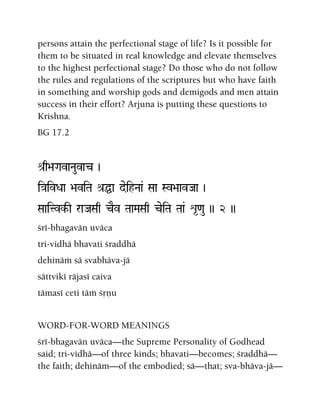
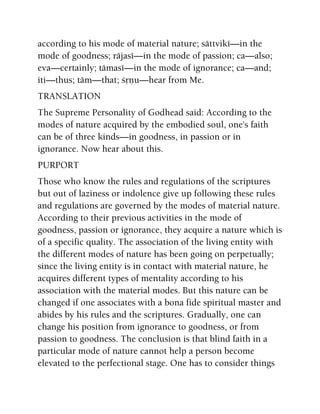
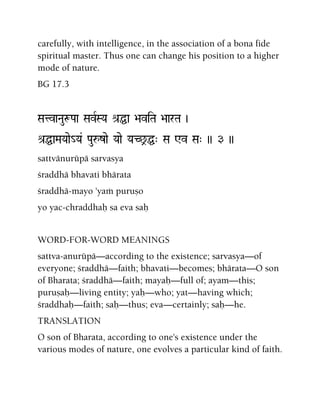
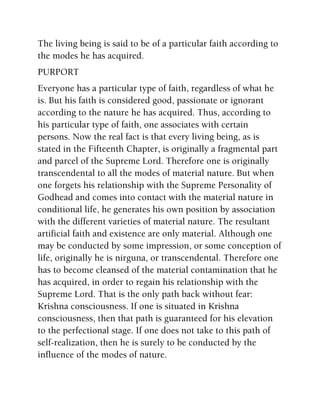
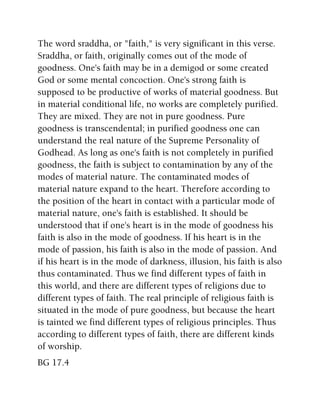
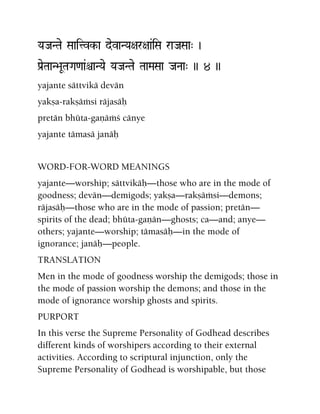
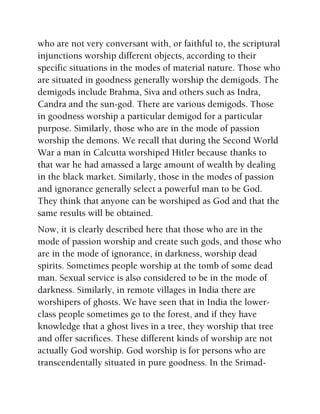
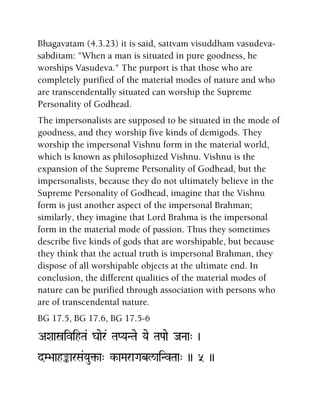
![k-zRYaNTa" XarqrSQa& >aUTaGa]aMaMaceTaSa" )
Maa& cEvaNTa" XarqrSQa& TaaiNvÖyaSauriNaêYaaNa( )) 6 ))
açästra-vihitaà ghoraà
tapyante ye tapo janäù
dambhähaìkära-saàyuktäù
käma-räga-balänvitäù
karñayantaù çaréra-sthaà
bhüta-grämam acetasaù
mäà caiväntaù çaréra-sthaà
tän viddhy äsura-niçcayän
WORD-FOR-WORD MEANINGS
açästra—not in the scriptures; vihitam—directed; ghoram—
harmful to others; tapyante—undergo; ye—those who;
tapaù—austerities; janäù—persons; dambha—with pride;
ahaìkära—and egoism; saàyuktäù—engaged; käma—of lust;
räga—and attachment; bala—by the force; anvitäù—impelled;
karñayantaù—tormenting; çaréra-stham—situated within the
body; bhüta-grämam—the combination of material elements;
acetasaù—having a misled mentality; mäm—Me; ca—also;
eva—certainly; antaù—within; çaréra-stham—situated in the
body; tän—them; viddhi—understand; äsura-niçcayän—
demons.](https://image.slidesharecdn.com/bg17-151031144145-lva1-app6891/85/Bg-17-11-320.jpg)
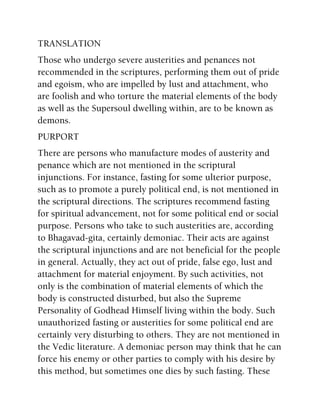
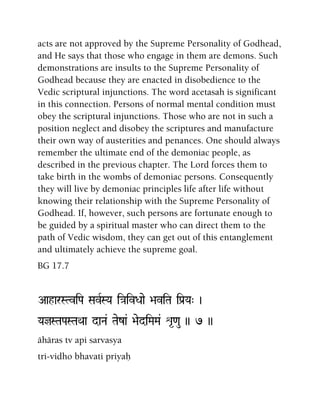
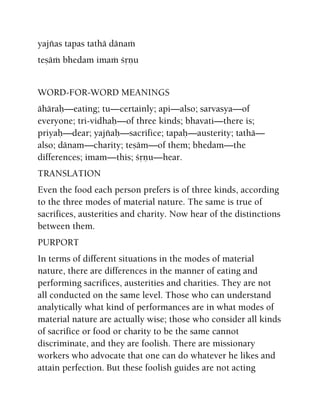
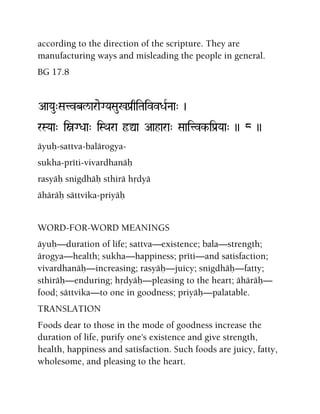
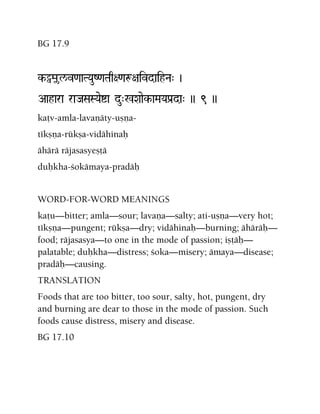
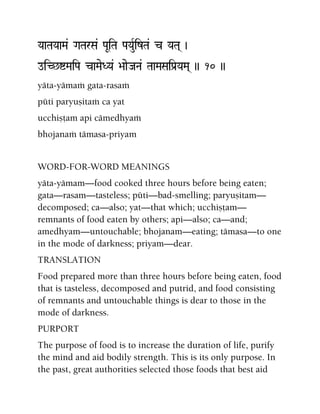
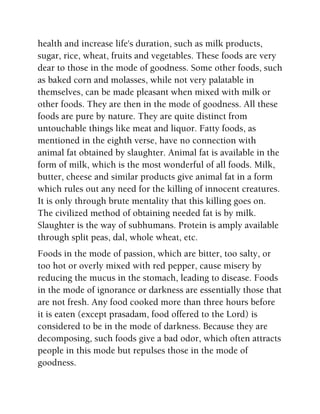
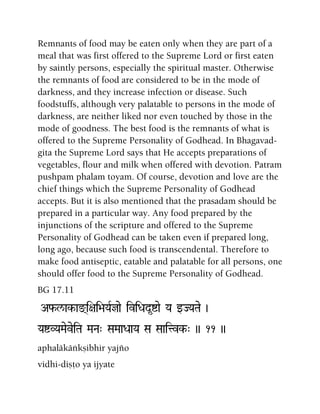
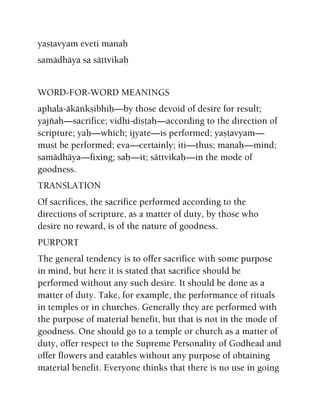
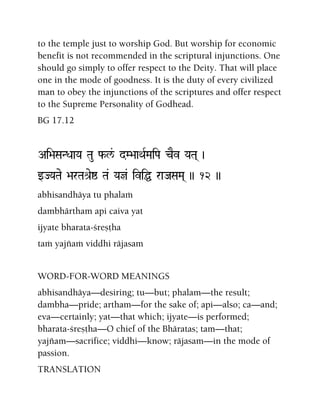
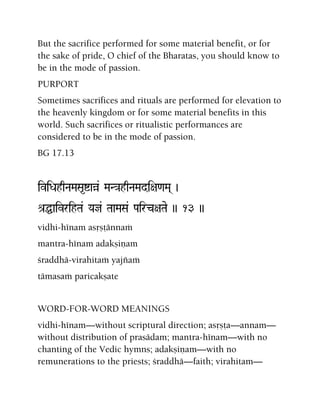
![without; yajïam—sacrifice; tämasam—in the mode of
ignorance; paricakñate—is to be considered.
TRANSLATION
Any sacrifice performed without regard for the directions of
scripture, without distribution of prasadam [spiritual food],
without chanting of Vedic hymns and remunerations to the
priests, and without faith is considered to be in the mode of
ignorance.
PURPORT
Faith in the mode of darkness or ignorance is actually
faithlessness. Sometimes people worship some demigod just
to make money and then spend the money for recreation,
ignoring the scriptural injunctions. Such ceremonial shows of
religiosity are not accepted as genuine. They are all in the
mode of darkness; they produce a demoniac mentality and do
not benefit human society.
BG 17.14
deviÜJaGauåPa[ajPaUJaNa& XaaEcMaaJaRvMa( )
b]øcYaRMaih&Saa c Xaarqr& TaPa oCYaTae )) 14 ))
deva-dvija-guru-präjïa-
püjanaà çaucam ärjavam
brahmacaryam ahiàsä ca](https://image.slidesharecdn.com/bg17-151031144145-lva1-app6891/85/Bg-17-23-320.jpg)
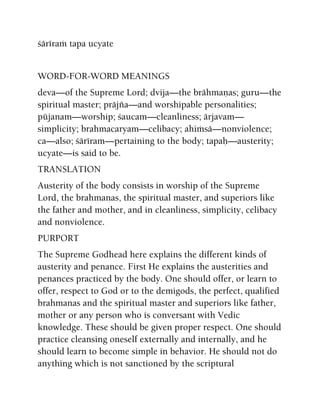
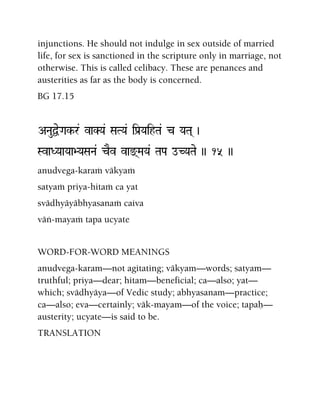
![Austerity of speech consists in speaking words that are
truthful, pleasing, beneficial, and not agitating to others, and
also in regularly reciting Vedic literature.
PURPORT
One should not speak in such a way as to agitate the minds of
others. Of course, when a teacher speaks, he can speak the
truth for the instruction of his students, but such a teacher
should not speak to those who are not his students if he will
agitate their minds. This is penance as far as talking is
concerned. Besides that, one should not talk nonsense. The
process of speaking in spiritual circles is to say something
upheld by the scriptures. One should at once quote from
scriptural authority to back up what he is saying. At the same
time, such talk should be very pleasurable to the ear. By such
discussions, one may derive the highest benefit and elevate
human society. There is a limitless stock of Vedic literature,
and one should study this. This is called penance of speech.
BG 17.16
MaNa"Pa[Saad" SaaEMYaTv& MaaENaMaaTMaiviNaGa]h" )
>aavSa&éuiÖirTYaeTataPaae MaaNaSaMauCYaTae )) 16 ))
manaù-prasädaù saumyatvaà
maunam ätma-vinigrahaù
bhäva-saàçuddhir ity etat](https://image.slidesharecdn.com/bg17-151031144145-lva1-app6891/85/Bg-17-26-320.jpg)
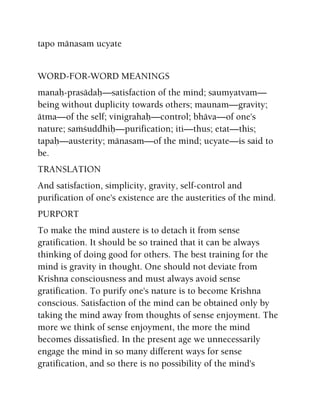
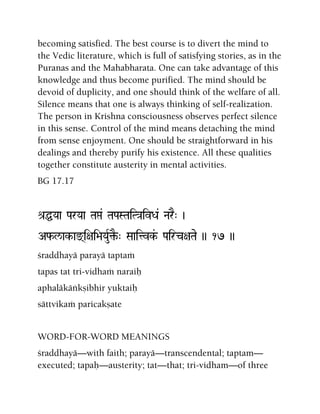
![kinds; naraiù—by men; aphala-äkäìkñibhiù—who are
without desires for fruits; yuktaiù—engaged; sättvikam—in
the mode of goodness; paricakñate—is called.
TRANSLATION
This threefold austerity, performed with transcendental faith
by men not expecting material benefits but engaged only for
the sake of the Supreme, is called austerity in goodness.
BG 17.18
SaTk-arMaaNaPaUJaaQa| TaPaae dM>aeNa cEv YaTa( )
i§-YaTae Taidh Pa[ae¢&- raJaSa& cl/MaDa]uvMa( )) 18 ))
satkära-mäna-püjärthaà
tapo dambhena caiva yat
kriyate tad iha proktaà
räjasaà calam adhruvam
WORD-FOR-WORD MEANINGS
sat-kära—respect; mäna—honor; püjä—and worship;
artham—for the sake of; tapaù—austerity; dambhena—with
pride; ca—also; eva—certainly; yat—which; kriyate—is
performed; tat—that; iha—in this world; proktam—is said;](https://image.slidesharecdn.com/bg17-151031144145-lva1-app6891/85/Bg-17-29-320.jpg)
![räjasam—in the mode of passion; calam—flickering;
adhruvam—temporary.
TRANSLATION
Penance performed out of pride and for the sake of gaining
respect, honor and worship is said to be in the mode of
passion. It is neither stable nor permanent.
PURPORT
Sometimes penance and austerity are executed to attract
people and receive honor, respect and worship from others.
Persons in the mode of passion arrange to be worshiped by
subordinates and let them wash their feet and offer riches.
Such arrangements artificially made by the performance of
penances are considered to be in the mode of passion. The
results are temporary; they can be continued for some time,
but they are not permanent.
BG 17.19
MaU!Ga]ahe<aaTMaNaae YaTPaq@Yaa i§-YaTae TaPa" )
ParSYaaeTSaadNaaQa| va TataaMaSaMaudaôTaMa( )) 19 ))
müòha-gräheëätmano yat
péòayä kriyate tapaù
parasyotsädanärthaà vä
tat tämasam udähåtam](https://image.slidesharecdn.com/bg17-151031144145-lva1-app6891/85/Bg-17-30-320.jpg)
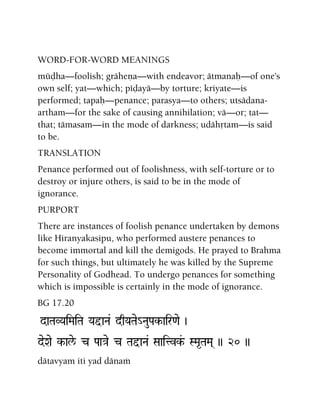
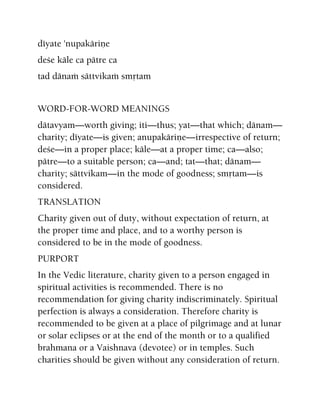
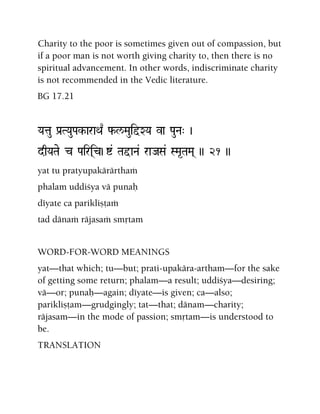
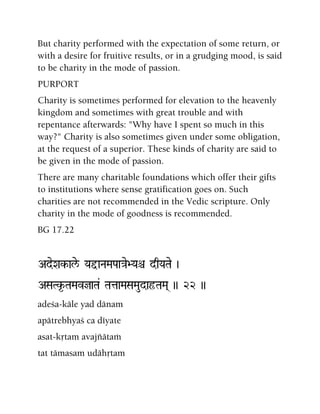
![WORD-FOR-WORD MEANINGS
adeça—at an unpurified place; käle—and unpurified time;
yat—that which; dänam—charity; apätrebhyaù—to unworthy
persons; ca—also; déyate—is given; asat-kåtam—without
respect; avajïätam—without proper attention; tat—that;
tämasam—in the mode of darkness; udähåtam—is said to be.
TRANSLATION
And charity performed at an impure place, at an improper
time, to unworthy persons, or without proper attention and
respect is said to be in the mode of ignorance.
PURPORT
Contributions for indulgence in intoxication and gambling are
not encouraged here. That sort of contribution is in the mode
of ignorance. Such charity is not beneficial; rather, sinful
persons are encouraged. Similarly, if a person gives charity to
a suitable person but without respect and without attention,
that sort of charity is also said to be in the mode of darkness.
BG 17.23
p TaTSaidiTa iNadeRXaae b]ø<aiñivDa" SMa*Ta" )
b]aø<aaSTaeNa vedaê Yajaê ivihTaa" Paura )) 23 ))
oà tat sad iti nirdeço
brahmaëas tri-vidhaù småtaù](https://image.slidesharecdn.com/bg17-151031144145-lva1-app6891/85/Bg-17-35-320.jpg)
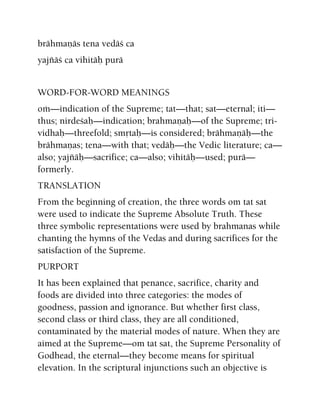
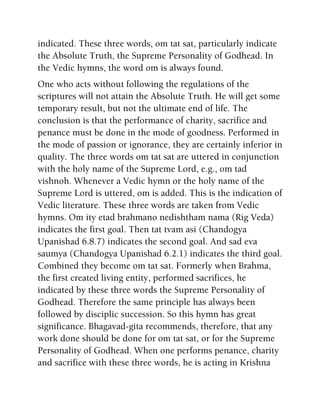
![consciousness. Krishna consciousness is a scientific execution
of transcendental activities which enables one to return home,
back to Godhead. There is no loss of energy in acting in such
a transcendental way.
BG 17.24
TaSMaad( p wTYaudaôTYa YajdaNaTaPa"i§-Yaa" )
Pa[vTaRNTae ivDaaNaae¢-a" SaTaTa& b]øvaidNaaMa( )) 24 ))
tasmäd oà ity udähåtya
yajïa-däna-tapaù-kriyäù
pravartante vidhänoktäù
satataà brahma-vädinäm
WORD-FOR-WORD MEANINGS
tasmät—therefore; oà—beginning with oà; iti—thus;
udähåtya—indicating; yajïa—of sacrifice; däna—charity;
tapaù—and penance; kriyäù—performances; pravartante—
begin; vidhäna—uktäù—according to scriptural regulation;
satatam—always; brahma-vädinäm—of the transcendentalists.
TRANSLATION](https://image.slidesharecdn.com/bg17-151031144145-lva1-app6891/85/Bg-17-38-320.jpg)
